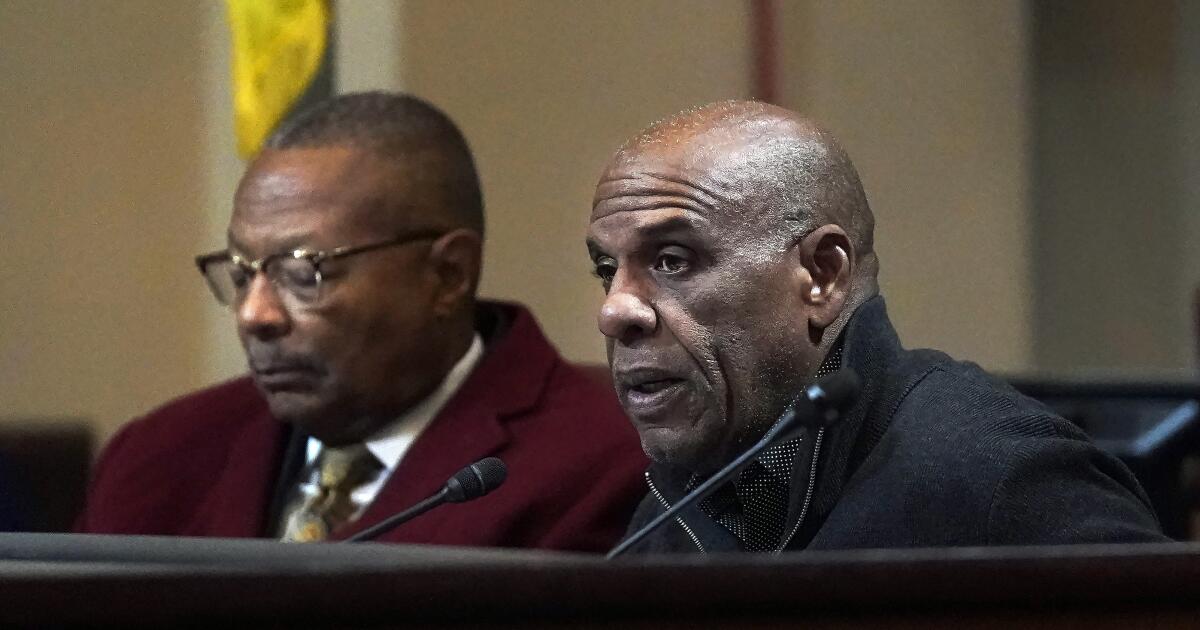Politics
Omar Draws Criticism for Suggesting Some Jewish Students Are ‘Pro-Genocide’
Representative Ilhan Omar made the comments at Columbia University, where her daughter was among the students arrested protesting against Israel’s actions in Gaza. The protests have drawn visits by leaders across the political spectrum.

Politics
AOC, 'baby girl' Marjorie Taylor Greene trade barbs in fiery Garland hearing: 'Are your feelings hurt?'

Reps. Alexandria Ocasio-Cortez and Marjorie Taylor Greene had a heated exchange Thursday evening during what was supposed to be a contempt hearing for Attorney General Merrick Garland.
The House Oversight Committee had originally been convened to hold Attorney General Merrick Garland in contempt for refusing to comply with a subpoena to hand over an audio recording of President Biden’s interview with a special counsel.
The hearing quickly spiraled out of control, with lawmakers bickering with one another. Less than an hour after the hearing was underway, Greene took shots at her Democratic colleague, Rep. Jasmine Crockett of Texas.
“Do you know what we’re here for?” Crockett asked Greene, who shot back: “I think your fake eyelashes are messing up what you’re reading.”
MENENDEZ CO-DEFENDANTS REVEAL STRATEGY TO BEAT THE RAP IN HIGH-STAKES CORRUPTIONAL TRIAL
L-R: Reps. Alexandria Ocasio Cortez and Marjorie Taylor Greene. (Getty Images)
House Oversight Committee Chairman James Comer pleaded for order amid audible groans in the chamber.
Ocasio-Cortez weighed in saying: “I do have a point of order, and I would like to move to take down Ms. Green’s words. That is absolutely unacceptable. How dare you attack the physical appearance of another person… move her words down.”
“Are your feelings hurt?” Greene asked.
“Oh girl, baby girl!” Ocasio-Cortez shot back. “Don’t even play!”
Ocasio-Cortez pushed to have Greene’s words “taken down,” which is a procedure to give a speaker the chance to withdraw their words or amend them if they are deemed out of order.
Comer suspended the hearing while lawmakers weighed striking Greene’s words. Ocasio-Cortez could be heard during discussion: “No way is that being allowed” and “not today.”
“We’re not going to do a smarmy apology. She has to actually apologize. And that needs to be up to Ms. Crockett as well,” Ocasio-Cortez said. “It needs to be sincere.”
Greene later agreed to strike her words but refused to apologize and insulted Ocasio-Cortez’s intelligence, prompting the Democratic Congresswoman to move to strike those words as well.
Later, Rep. Jamie Raskin, D-Md., who pushed for the court clerk to report the words, asked Greene again if she would apologize, to which she responded: “You will never get an apology out of me.”
Crockett later reacted to the brouhaha on X.
“So MTG wanted to talk about my appearance in COMMITTEE?!” Crockett wrote on X. “This is what happens when mentally deficient people who can’t read and follow rules or just don’t give a damn… somehow end up in CONGRESS!”
The Associated Press contributed to this report.
Politics
After Assembly issues apology for California's role in slavery, some reparations bills die in Senate

The California Assembly on Thursday voted to issue an official apology for the state’s role in slavery and the systemic racism that ensued, but other bills meant to offer reparations died shortly afterward in the Senate.
The apology is in a bill authored by Assemblymember Reggie Jones Sawyer (D-Los Angeles) that accepts responsibility for “all of the harms and atrocities committed by the state” and is part of a hard-fought legislative package for reparations for descendants of African Americans who were enslaved.
“Not only is the apology letter important, it’s what we do after — it’s whether or not we go ahead and fulfill the dream of what my ancestors wanted, which is to fully make us part of the American dream,” Jones-Sawyer said on the Assembly floor, receiving hugs and applause after the passage of AB 3089. The bill now moves to the Senate.
Less than an hour later, other reparations-related bills died in a key fiscal committee as the state grapples with a massive budget deficit.
Two bills by Sen. Steven Bradford (D-Gardena) were held back by the Senate Appropriations Committee. The legislation would have offered property tax credits and financial aid to purchase property to descendants of African Americans who were enslaved.
“We know we build generational wealth through home ownership, and African Americans have been denied home ownership since the Emancipation Proclamation. Their freedom, it was about land,” Bradford said in Sacramento on Thursday.
Bradford said he was disappointed but pointed to other reparations bills that survived Thursday’s “suspense file” process — the ritual culling of any legislation with a price tag that is sometimes used as a way for Democratic leaders who control the Legislature to eliminate controversial bills.
Bradford’s failed bills were not part of the primary reparations package promoted by the California Legislative Black Caucus, of which he is a member. Reparations advocates have been divided on the best success strategy after years of deliberation as they aim to create a first-in-the-nation plan to offer tangible benefits to descendants of the enslaved. The caucus has so far stopped short of calling for cash payments to those eligible — a priority of some Black advocacy groups but an idea that polling has shown is overwhelmingly unpopular with voters.
The Black Caucus’s core reparation bills are still moving through the legislative process, including proposals to limit solitary confinement in prisons and jails and compensate Californians for land taken by eminent domain.
Sen. Anna Caballero (D-Merced) chairs the Senate Appropriations Committee and pointed to the state’s financial problems as reason for the killing of Democratic-backed bills on Thursday.
“The next couple of years will be difficult for the legislative and budget processes,” she said. “Finding balance will be critical to ensure that we can continue to make our government work efficiently and prudently.”
Jones-Sawyer’s apology bill does not have a large price tag and is the first step for the Black Caucus as it pushes for the passage of the rest of its reparation legislation.
“It is undeniable that our systems of government have been complicit in the oppression of African Americans. … California’s history is tarnished by the subjugation of Black people,” Assembly Speaker Robert Rivas (D-Salinas) said in support of AB 3089 on Thursday. “It is a wound that still needs to heal.”
The bill saw unanimous support from Democrats, but several Republicans abstained from voting on it, including Assembly Republican Leader James Gallagher of Yuba City, who called slavery “a terrible stain on our history” but took issue with pieces of the bill that say the state is still denying Black residents some rights and that police shootings are “state-sanctioned violence.”
“We have made tremendous progress toward a more equal society,” Gallagher said in a statement.
Politics
Alaska lawmakers end their session with late bills passing on energy, education

Alaska lawmakers ended their four-month session early Thursday with a flurry of last-minute bills addressing priority issues such as energy and correspondence school programs that are a focus of ongoing litigation.
Bickering over the budget was muted compared with prior years, and Republican Gov. Mike Dunleavy and legislative leaders claimed successes in a session that was not without drama, marked by twofailed attempts to override Dunleavy vetoes of additional public school funding.
ALASKA LAWMAKERS FAIL TO OVERRIDE OF GOV. DUNLEAVY’S VETO OF EDUCATION PACKAGE
EDUCATION
Education was billed as a top priority, and lawmakers in the bipartisan-led Senate and Republican-led House overwhelmingly passed a compromise package that included a permanent $175 million increase in aid to districts through a school funding formula. But Dunleavy, who had sought charter school provisions and a three-year teacher bonus experiment that divided lawmakers, vetoed the measure.
A veto override attempt failed, along with efforts in the House to cobble together another package. Ultimately, lawmakers settled for pieces including a one-time, $175 million boost to the foundation formula in the budget and additional funding intended to help K-3 students with reading.
Last year, Dunleavy vetoed half of a one-time, $175 million boost to schools but has signaled willingness to support the increase in the just-passed budget.
Sen. Löki Tobin, a Democrat who chairs the Senate Education Committee, said work remained to address issues facing public schools, which “are still going to be struggling” because the funding approved is inadequate. School officials and education advocates had pushed for a roughly $360 million permanent increase in funding.
Tom Klaameyer, president of NEA-Alaska, a teachers’ union, said the Legislature’s failure to reinstate a pension offering for public employees also was disheartening. A pension bill narrowly passed the Senate but stalled in the House. Senate leaders said work would continue around retirement issues.
Late in session, lawmakers pivoted to correspondence schools, which allow for students to be homeschooled under the authority of school districts. That focus came after a judge found that laws around correspondence school allotments “were drafted with the express purpose of allowing purchases of private educational services with the public correspondence student allotments.” Under the state constitution, public funds cannot be paid “for the direct benefit of any religious or other private educational institution.”
Lawmakers passed a bill with provisions aimed at providing stability for correspondence students while the litigation plays out.
“The idea was to be able to give some peace and calm to the people out there, the 22,000 students, who weren’t sure what was going to happen,” House Speaker Cathy Tilton, a Republican, told reporters early Thursday.
UNDERGROUND CARBON STORAGE
The second of two bills proposed by Dunleavy as a way to capitalize on interest by companies with carbon emission reduction goals passed, allowing the state to establish a system and protocols for underground storage of carbon dioxide, with an eye toward using pore space in aging gas or oil fields, such as Cook Inlet or on the North Slope.
Lawmakers last year passed Dunleavy’s bill allowing the state to set up carbon sequestration projects or to lease state lands to a third party wanting to develop a carbon project. Draft regulations for the offsets program were released in March.
Dunleavy previously pitched the bills as a novel means for Alaska to generate perhaps billions of dollars in new revenue while still embracing fossil fuel production and other resource extraction, such as timber harvests and coal production. But the revenue impact of the proposals remains speculative.
To pay for government, the state relies heavily on oil revenue and earnings from its nest-egg, an oil-wealth fund that has grown through investments. Lawmakers have been reluctant to raise taxes on industries, like oil, and Alaska, with about 737,000 residents, has no statewide sales or personal income taxes.
Rebecca Noblin is the policy justice director with the group Native Movement. In written testimony this month on the underground carbon storage bill, she said the measure “would allow oil and gas companies and coal plants to inject carbon from their operations back into the ground” and will “increase pollution, cost the state money and distract from real solutions to climate change.”
ENERGY
The carbon bill, HB50, also included a provision supporters said could encourage more gas production in Cook Inlet. So-called reserve-based lending would allow for the issuance of loans made against and secured by an oil and gas field, proven reserves or other assets of the borrower. Under the bill, loans could be made by the Alaska Industrial Development and Export Authority, a state corporation, for projects it deems necessary to bolster production.
Residents in Alaska’s most populous region rely on gas from the aging Cook Inlet basin. But gas availability has become a concern and was a focal point this session. In February, Luke Saugier, senior vice president for Hilcorp Alaska, told lawmakers that while the company is “not pulling back” on investments in Cook Inlet and is committed to developing its leases, gas under its lease holdings can’t meet all the region’s gas demand. He said other sources of energy are needed.
Sen. Bill Wielechowski, an Anchorage Democrat, said the lending provision could unlock gas fields and end up being “one of the most important things that we have done this year.”
Dunleavy’s office also applauded passage of a separate measure that it says would streamline tax and tariff policies “to make new and existing electrical generation projects more affordable.”
“That in turn incentivizes independent power producers to move forward on renewable power projects like solar and wind farms along the Railbelt,” his office said in a statement.
DIVIDEND
The size of the annual dividend paid to residents has often been one of the major points of contention, contributing to drawn-out or special sessions. But there was little pushback this year, with lawmakers agreeing to a dividend of roughly $1,360 and an energy relief payment of $295.
Legislative leaders pointed to better communication and a balancing of priorities, including what Republican Rep. DeLena Johnson, a House Finance co-chair, called a “solid” state infrastructure budget.
-

 Politics1 week ago
Politics1 week ago'You need to stop': Gov. Noem lashes out during heated interview over book anecdote about killing dog
-

 Politics1 week ago
Politics1 week agoRFK Jr said a worm ate part of his brain and died in his head
-

 World1 week ago
World1 week agoPentagon chief confirms US pause on weapons shipment to Israel
-

 Politics1 week ago
Politics1 week agoHere's what GOP rebels want from Johnson amid threats to oust him from speakership
-

 World1 week ago
World1 week agoPro-Palestine protests: How some universities reached deals with students
-

 World1 week ago
World1 week agoConvicted MEP's expense claims must be published: EU court
-

 Politics1 week ago
Politics1 week agoCalifornia Gov Gavin Newsom roasted over video promoting state's ‘record’ tourism: ‘Smoke and mirrors’
-

 Politics1 week ago
Politics1 week agoOhio AG defends letter warning 'woke' masked anti-Israel protesters they face prison time: 'We have a society'













